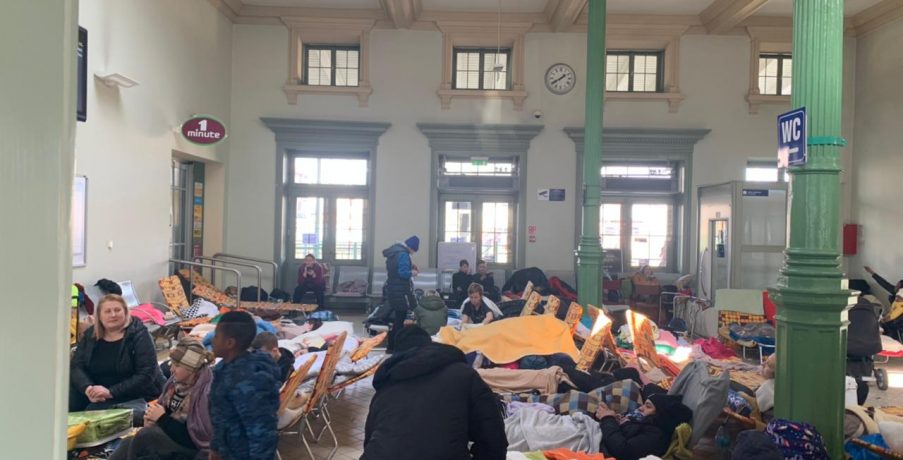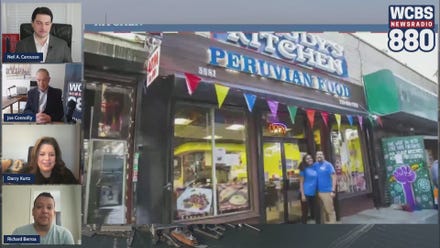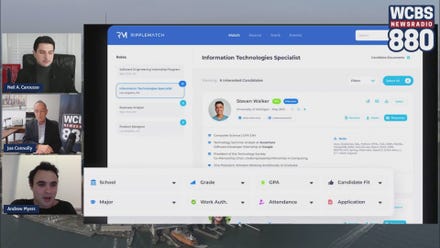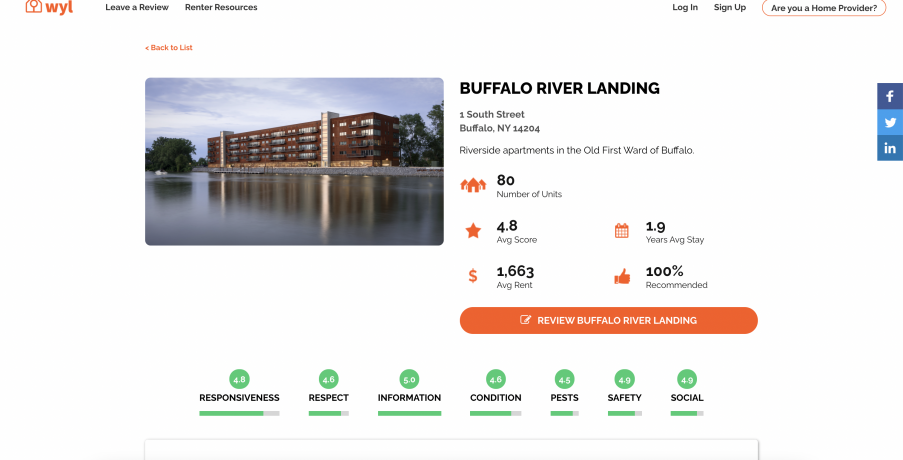
Neil A. Carousso produces NewsNation original “Kurt’s Country” – a celebration of country music and a slice of Americana with host Kurt Bardella.
The Latest
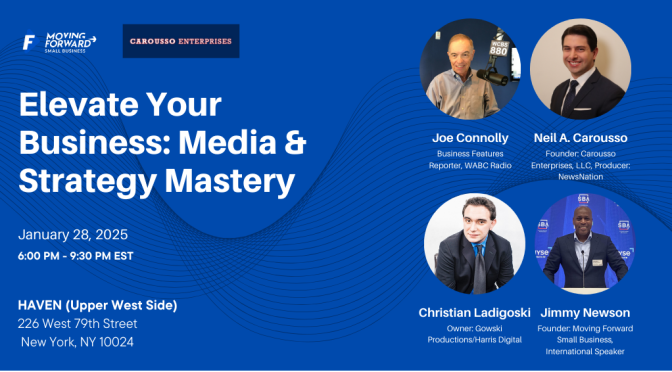
Elevate Your Business Event: Media & Strategy Mastery

Mastering Media Strategies: Insights from Industry Veterans

The Multi-Tiered Approach to Gaining Exposure and Credibility. Become a Repeat Source for the Media

Husband Sent Flirty Texts before Mica Miller’s Death, Waitress Says

Kristi Noem on Retraction: Kim Jong Un ‘Should Not be in the Book’

Kevin O’Leary: AI bossware can ID protesters and bar them from jobs

Neil A. Carousso Joins Growing NewsNation Network

Neil A. Carousso Departing WCBS 880

Art Business Founded by Former Foster Child Speaks to the Human Experience

1010 WINS Small Business $10K Challenge: Small Business Owners Make their Pitch for $10,000
-
INTERVIEW: Refugee who escaped to Poland helps fellow Ukrainians seeking safety
Posted by: Neil A. CaroussoPost Views: 623By Neil A. Carousso
NEW YORK (WCBS 880) — More than 1 million people have fled Ukraine since Russia invaded last week, accounting for 2% of the Ukrainian population.
A refugee who escaped the war and bloodshed in Ukraine is now helping his fellow Ukrainians cross the border into Poland, where they have been welcomed with open arms.
Mykola Golubei escaped Kyiv with his wife last week after waking up in the middle of the night to Russian rocket attacks.
“Suddenly I realized that I could die every moment,” Golubei told WCBS 880. “Each second could be the last second of my life because the rocket could get in the building where I was so I just started catching all the things I could, taking my wife. My mom was in shock. I realized that the war started and my wife said, ‘No, no it’s something, maybe gas, or something.’ And we ran on the subway and I have a WhatsApp chat with three of my close friends and one of them typed in the chat, ‘Hey guys, I just saw the light of the rocket attack.'”
Golubei and his wife went got on a train at a nearby station, without even knowing where it was going, just to escape Kyiv.
He realized halfway through the trip that the train was bound for Poland.
For the first two days, he and his wife were in terrible shock, jumping at every sound, fearing that the war had reached Poland.

A shelter in Poland where Mykola Golubei is staying after fleeing Ukraine. Photo credit Mykola Golubei. By the third day, he started receiving messages from others seeking help to find a car or bus to get out of Ukraine.
Golubei is now in a shelter in Poland, near the Ukrainian border, where he is organizing efforts to help citizens who are seeking refuge. He and a group of at least eight other people started a coordination center for volunteers to assist Ukrainians seeking safety.
“We need food, we need medicine, we need sleeping bags, but first of all we need the war to stop,” he said. “We need a lot of government organizations to help the Ukraine army, but a lot of people just go and help to protect the citizens — they don’t have ammunition, they don’t have the protection on their head, protection on their heart. We don’t ask for rockets, we just ask for something to protect people.”

Inside look of a boarded up bomb shelter in Ukraine. Photo credit Image courtesy of Mykola Golubei. Golubei said he feels guilty that he is safe in Poland and is trying to get others out.
“I feel shame and guilt,” he said. “My wife and me feel the guilt that we are here now and safe and our friends are there and so that’s why we give, all of us, our time and energy and desire to help other people.”
The Russian invasion of Ukraine has upended not only his life, but the lives of all Ukrainians, and now Golubei is solely focused on the other refugees that he is trying to help.
“You know, do you have experience when you have a plan? Plan on vacation? Plan next week? I have a lot of plans and now my plans are just the next right action,” he said. “Last Wednesday, I had a plan with my wife. We went to buy pets, two rats in a zoo shop, it was our plan, and we were thinking which of them we wanted to buy the next day, and the next day the war started and so all of my plans are just ruined. So I try to be as busy as I could all day long, calling somebody, typing, put post, go to the train station, talk to the people.”

Mykola Golubei said his friend sent him this photo of people hunkering down in a bomb shelter in Ukraine. Photo credit Mykola Golubei. Golubei said most of his friends have decided to stay in Kyiv and Kharkiv and are ready to die for Ukraine.
He is heartbroken by the images he is receiving from friends and family of bomb shelters that have been set up in the place where he calls home.
“I have just one question — why?” Golubei said. “I couldn’t explain myself why Vladimir Putin started doing this because if he had all the power in the world he could build a university, he could start an educational program, he could do everything with the money that he’s got. Why did he start the war? I don’t understand.”
There are several organizations that are collecting donations for Ukraine relief efforts including the Ukrainian Red Cross and the International Rescue Committee, the United Nations World Food Programme, Doctors Without Borders among others.
-
Bronx Restaurant Grows Revenue during Pandemic after Key Improvement
Posted by: Neil A. CaroussoPost Views: 709By Joe Connolly and Neil A. Carousso
NEW YORK (WCBS 880) — Richard Berroa is taking back control from delivery apps that cut into his profit using his own newly-optimized website, which has opened the door to entirely new revenue streams while restaurants like his have suffered numerous setbacks in the recovery from the COVID-19 pandemic.
Berroa is an FDNY paramedic who opened Claudy’s Kitchen, a Peruvian restaurant in the Bronx, with his wife Claudia in June 2020.
“We knew that we’d be mostly takeout,” he said on the WCBS Small Business Spotlight, sponsored by Dime Community Bank.
But, the website Berroa first created on his own did not meet today’s demands for online ordering. The Bronx Chamber of Commerce connected Claudy’s Kitchen with the Small Business Resource Network – a public-private partnership created during the pandemic to help small businesses with digital marketing and technology resources and training.
“Having the third parties did help us survive and move forward, but you know, we’ve gotten past that stage and now we want to keep more of the share,” said Berroa.
BentoBox specializes in developing websites and digital ordering systems for restaurants while allowing establishments ownership of customer data for marketing, unlike the third-party apps. The company overhauled the website for Claudy’s Kitchen with the goal of matching the customer experience online with the quality of service patrons expect in-person.
“We really have their whole digital storefront available to them, so that’s become increasingly important through COVID,” said BentoBox chief marketing officer Darcy Kurtz. “I think kind of the post-COVID modern restaurant is going to really have to have all this digital property in place because consumer behavior is just permanently changed at this point.”
She told WCBS 880 that 77 percent of diners go online before heading to a restaurant.
“There was a very real concern that technology impeded their most important thing, which was delivering hospitality,” Kurtz said, continuing, “Hospitality at its roots is about relationships. It’s about being in-person. But, what we found is that technology actually can enhance hospitality. It doesn’t have to be a barrier to (it).”
“The big thing is that we’re getting more in-house orders,” said Berroa. “I see the Grubhub and the Uber orders dipping down while our in-house Bento(Box) is going up. So, so far it’s working.”
BentoBox’s technology also allows restaurants to upsell and cross-sell customers at checkout in a way that adds value to the customer experience. As a result, Berroa said, Claudy’s Kitchen is getting more combination orders that increase the average per ticket.
“If you’ve done it lately, you will see things like, ‘Hey, you bought the hamburger. Are you sure you don’t want fries?’ Some of the things that happen naturally in-person when you go to a restaurant, you want your online experience to be able to help do that so that your online ordering is equal or higher total ticket prices than your dine-in. You don’t want that to be some trade-off that you’re having to make,” said Kurtz.
Claudy’s Kitchen also has a section for events that BentoBox sees as one of many incremental revenue streams that can hedge against COVID surges.
“You’ve got to find ways whether it’s online ordering, whether it’s selling your merchandise, sell your barbecue sauce, sell your T-shirts, you know, do events, and have event management, but just find something else to give you an ongoing revenue stream so that you can level out some of that variability of the dine-in,” Kurtz explained.
See the platform BentoBox developed for Claudy’s Kitchen along with growth ideas for restaurants on the WCBS Small Business Spotlight video above.
-
RippleMatch Platform Improves Early Career Hiring Process
Posted by: Neil A. CaroussoPost Views: 930By Joe Connolly and Neil A. Carousso
NEW YORK (WCBS 880) — RippleMatch helps college students and recent graduates launch their careers while improving employee retention rates by using data to find the best fit.
“If you’ve ever had the experience of applying for a job, it’s often that you throw your resume into a black hole and just sort of hope that someone maybe gets back to you,” said RippleMatch founder and CEO Andrew Myers on the WCBS Small Business Spotlight, sponsored by Dime Community Bank.
“With RippleMatch, you know, we only present opportunities on the platform when a candidate’s very likely to be a good fit. They generally hear back really, really quickly. They always get an answer,” he said.
Myers said that 66 percent of candidates on RippleMatch have gotten called for an interview.
He founded the company in 2015 in his dorm room at Yale University after feeling dejected when he only got three or four job interviews out of 55 applications. Calling the process “overwhelming” and “daunting,” Myers sought a better way for his peers using data predictive analytics to match early career candidates with jobs where they are most likely to succeed.
“Our mission (is) to replace job boards,” he said.
RippleMatch is free for candidates. It earns all its revenue from employers that now include Amazon, eBay, and Ernst & Young.
“One of the deals we make with every company that we work with is they commit to certain standards in terms of candidate experience and how they’re going to get back to candidates, and very typically prioritize the RippleMatch candidates that they’re getting matched with in terms of getting them into the interview process,” said Myers. “We just establish workflows on the back end that sort of get candidates into the company as fast as we possibly can, which is generally an advantage when it comes to candidate experience.”
He said retention rates among Gen Z employees that used RippleMatch are much higher as a result.
“The single thing (Gen Z employees) want most is professional development,” Myers said, continuing, “Within our own Gen Z workforce, we’ve seen really good retention within roles and I know a lot of our stronger companies have as well. So I actually think that good professional development with Gen Z employees can actually be a pretty effective strategy even in the heart of the Great Resignation. And, I think that there’s actually more shifting going on in sort of later stage positions than there are with Gen Z compared to millennials who are already pretty jumpy themselves. There’s not like a big Gen Z jump or anything like that that we’re seeing.”
He said RippleMatch has upended the belief that the best talent comes from prestigious universities and it has the data to support it.
“If you’re clinging to the notion that a candidate had to go to Princeton or you’re over attached to degree pedigree, I think it can actually mean you miss out on phenomenal talent,” said Myers.
See how RippleMatch works for both job candidates and employers on the WCBS Small Business Spotlight video above.
-
Whose Your Landlord Introduces Transparency, Accountability to Residential Rental Market
Posted by: Neil A. CaroussoPost Views: 653By Joe Connolly and Neil A. Carousso
NEW YORK (WCBS 880) — This business is redefining the landlord-tenant relationship.
While studying entrepreneurship, management and information systems at Temple University, Ofo Ezeugwu saw first-hand that the trust between landlords and tenants was broken. He thought there had to be a better system, and in 2015, he founded Whose Your Landlord.
“Housing started coming up a lot as we were talking to students,” he explained to Joe Connolly and Neil A. Carousso on the WCBS Small Business Spotlight, sponsored by Dime Community Bank.
“There was (sic) so many issues around infestation or harassment between male landlords and female residents,” Ezeugwu said. “Things that, you know, quite honestly, no one should go through.”
As a first-generation American whose mother is from Barbados and father is from Nigeria, he was motivated to make an impact and solve a glaring problem in the residential rental market.
“At first, I thought there had to be some way just to review landlords so you knew what to expect before signing your lease. And honestly, as we built that out, there was (sic) so many other value-adds that having that insight be more prevalent in this industry,” said Ezeugwu.
Whose Your Landlord launched in New York and Pennsylvania where he was attending school at Temple. Today, it is available in 400 cities with 25,000 different landlords and property managers reviewed on the platform.
Tenants share their experiences in an apartment building, which informs others looking to rent. Reviews are vetted so it is appropriately mixed between positive and negative, and topics range from the landlord-tenant relationship to living conditions.
“We see ourselves as being the number one used platform when it comes to resident reviews and analyzing resident insights for home providers,” Ezeugwu said, adding, “We also see ourselves really shifting that culture, that relationship between residents and home providers, forever.”
This year’s Forbes 30 Under 30 winner for social impact told WCBS 880 he has observed rental conditions improving in Charleston, SC, Dallas and Houston, TX.
“I think if we can kind of recreate how we think about our industry as a collective, it’s only going to lead to more positivity.”
He said landlords benefit, too, from data that helps them provide better service and grow their real estate businesses.
“They’re actively asking, ‘We want feedback. We want insights. Please share that with us,'” said Ezeugwu.
Some of the analytics Whose Your Landlord collects and provides property owners for a fee, include complaint trends from appliances being out of service to snow and ice removal.
The company also sells advertisements on its website to major brands who can further serve tenants.
“So if you are Allstate, you know, renters insurance is huge and it’s actually pretty cheap comparatively to other insurances. So, why not protect your apartment and your car if people don’t usually often realize your car gets broken into that covers it, too?” said Ezeugwu of one brand partnership.
“We would create content like that that helps support renters,” he said. “It was always adjacent to their experiences so that it would be more valuable to them as a(n) overall platform.”
See more about Whose Your Landlord and get growth ideas for your business on the WCBS Small Business Spotlight video above.
-
How to Create ‘FOMO’ in Virtual Events to Grow Sales
Posted by: Neil A. CaroussoPost Views: 572By Joe Connolly and Neil A. Carousso
NEW YORK (WCBS 880) — No one wants to feel left out.
Some businesses have been thriving in the digital space and using virtual events to drive sales. While virtual events allow companies to reach audiences outside their normal radius, combating Zoom fatigue can be the biggest barrier.
VeeKast president and CEO Donvil Collins’ advice: “Find some way to give your viewers 10 seconds of fame.”
He told Joe Connolly and Neil A. Carousso on the WCBS Small Business Spotlight, sponsored by Dime Community Bank, that people on the other end of the computer need to feel like they are part of an experience. It won’t be successful if it’s one-way communication.
“Especially thinking about the chat, can people respond? Are people in the broadcast able to respond to the people that are watching?”
One of VeeKast’s clients, Collins said, had been drawing about 400 people for in-person events pre-pandemic. It had a live audience of 2,000 people online and they got more than 6,000 views of its event on-demand.
“Really part of what they did was creating what I like to call ‘FOMO,'” he said of the acronym that stands for “Fear of missing out.”
“That’s one of the big things that organizations are missing sometimes and not only getting people to watch it live and not feel like they’re just watching, they’re actually a part of this event. It’s not a production, it’s an event,” Collins explained, continuing, “And then for the replay, it’s ‘What did you miss? What’s the big deal?’ So I think FOMO is a big part of driving engagement, views, and all of that.”
VeeKast was founded in 2013 as an in-person events and video production company based in White Plains, NY. Collins made commercials and other advertising while also producing some livestreaming events. By focusing on virtual events during the pandemic, Collins said they doubled their business both in 2020 and 2021 from the year prior.
“Our goal for this year is we’re just going to push it and try to triple the business,” he said. “At least from what we’re seeing in an increase, there’s a lot of opportunity there because there’s so much need for help. People want to get this stuff done, but they don’t really know how, and they just need a single mind or a managerial company or someone that can come in with all the gear and actually help them do it well.”
VeeKast prides itself on producing virtual events that look like the Academy Awards with overlay designs and professional audio/video equipment they supply as part of a “remote broadcast kit.”
“We send a lavalier mic, we also send tripods and we send them a link that we can control the camera equipment remotely,” said Collins.
“From your offices in Westchester, you’re running a whole TV network like a control room now,” noted Connolly.
“There’s some that was (sic) international locations in Europe and other places and we are controlling the gear that is there so we can get the quality of the recording to be better.”
See ways businesses are leveraging broadcast quality virtual events to grow sales on the WCBS Small Business Spotlight video above.


